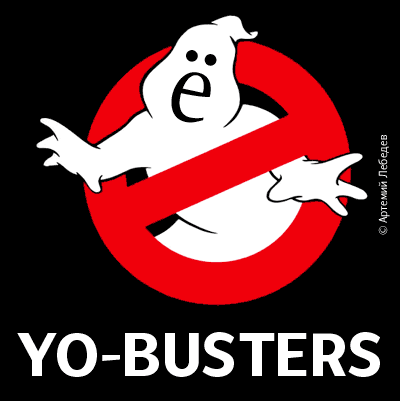Ё
The newest letter of the Russian alphabet is ё. Although it was first used in print in the 18th century, it didn't become an official letter until the middle of the 20th century. It's the naughtiest of Russian letters because it's the first letter of the masculine past tense form of the Russian eff word. Now of course Russian Word of the Day readers are much too cultured to bother looking up the ten thousand ridiculously creative ways the Russians use that verb and all its variants, but they should know the several euphemisms for that word that occasionally show up in conversation, particularly «ёлки-палки», a mild phrase which we can translate as “oh, fudge” or “holy moly” or “oh, crud” or “hell's bells” It can express surprise, disgust, or pain. Russians also say «ё-моё», which means roughly the same thing, but is maybe slightly less vulgar.
| Ёлки-палки! Опять написали в лифте! | Oh, hell! Someone pissed in the elevator again! |
| Ё-моё! Та секвойя должна быть высотой сто метров! | Holy moly! That redwood tree must be three hundred feet high! |
The picture you see at the right is a monument that was erected to the letter ё in the city of Ульяновск, which has about the same emotional effect as erecting a monument in the states to the letter eff. It has always surprised me that local authorities let the monument go up.
Since until relatively recently it was simply considered a variation on the letter е, sometimes dictionaries treat the letters as the same. Thus you might find the word ёж in the е section, or you might find it in its own ё section. If you have trouble finding a word with that letter, double check to see if it's in another section, or check to see whether the word is alphabetized differently than you first thought. Properly speaking, if two words differ only by е/ё, theoretically the е version should come first and the ё version should come second. If you are dealing with lists sorted by computer, be aware that there may be an additional problem. If the algorithm a program uses does not conform to the current rules, then you might unexpectedly find ё sorted before а or after я or inconsistently before/after е.
For the most part Russians don't write the double dots over the ё. It's only used in textbooks for kids and foreigners, in dictionaries, and occasionally in regular writing when otherwise the text would be ambiguous, for instance in distinguishing все “everbody” from всё “everything” or осел “settled” from осёл “donkey.” Interestingly enough, if you write the double dots in a text where people aren't expecting it, it feels awkward to the Russians and slows down their rate of reading, just as when Americans may trip over spellings like coöperation and hæmoglobin. That fact occasionally leads to rational discussions, rants and diatribes, and sometimes to amusing art:
2 comments
Ё-моё! now I know what the young Chekov was saying in the newest Star Trek movie!
Spasibo!
From what I understand (according to my Russian teacher in Moscow), there was actually a law passed in Moscow a few years ago that required everybody to use the two dots when printing ё in a book/newspaper/whatever, but nobody really paid any attention.
This led to me, under my teacher’s careful tutelage, writing a very snarky Russian-style letter of complaint to a newspaper editor.. I wish I still had it with me, it’s with all my papers at home.
Don responds: I recall that several years ago the Duma made obligatory the use of the double dots over ё in all documents produced by that body. Whether they actually followed through with that, I have no idea.
Form is loading...

